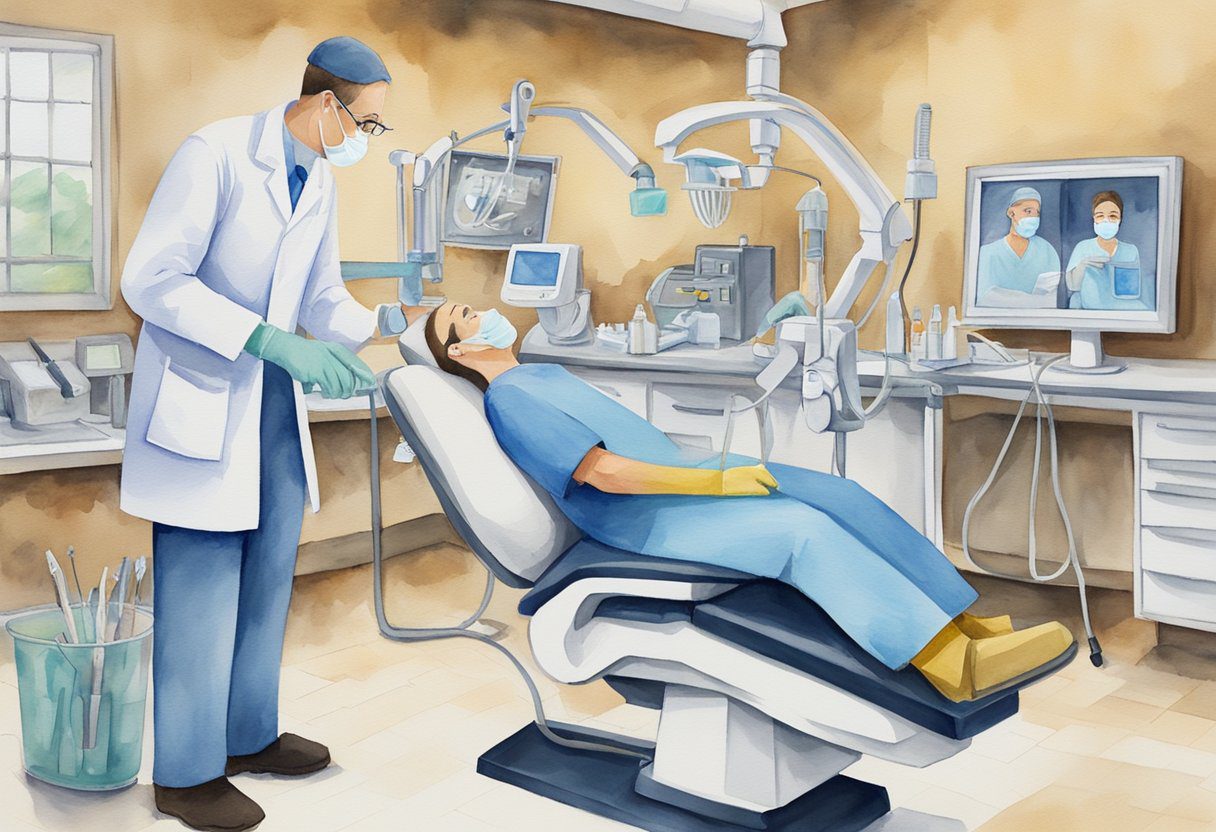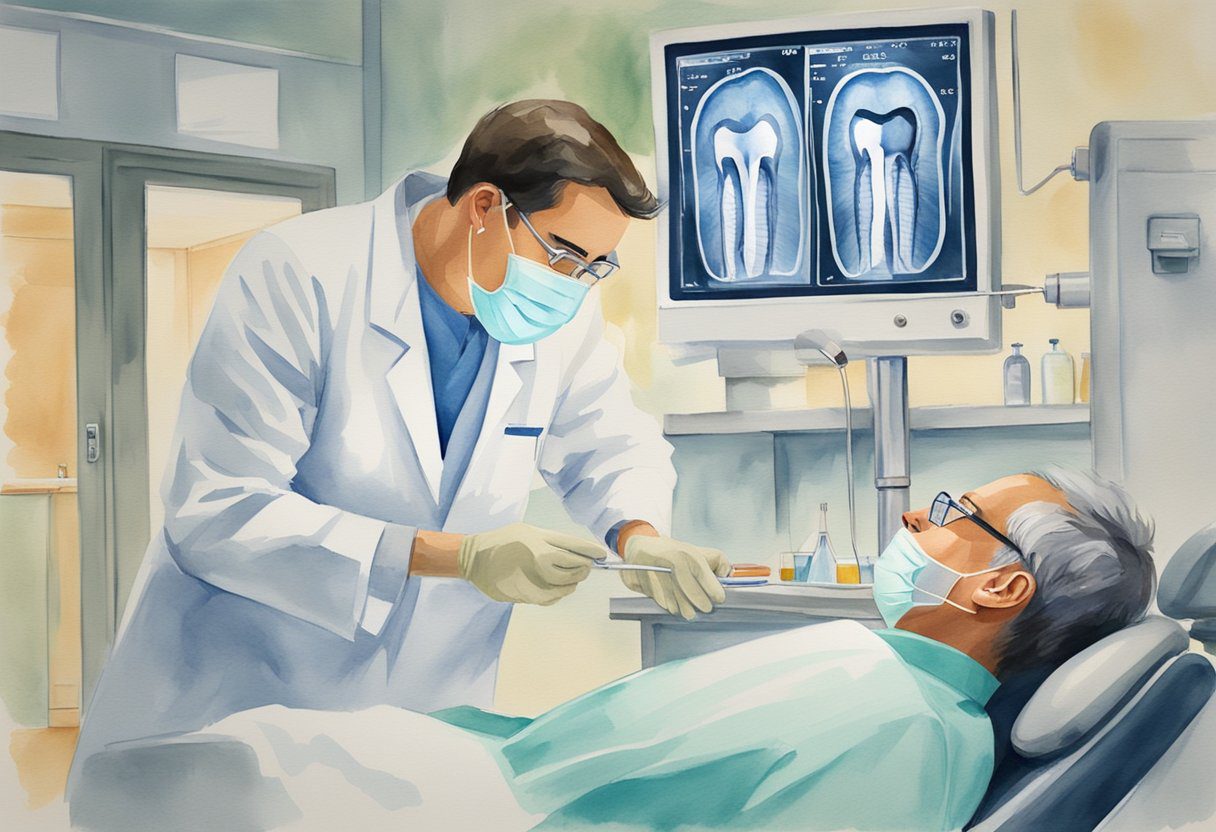The question whether root canal treatment is linked to cancer has circulated among patients and professionals, causing considerable concern.
A root canal is a common dental procedure designed to treat infection at the center of a tooth. It aims to save the tooth while eliminating bacteria from the infected root canal to prevent reinfection and further complications.
The notion connecting root canals to cancer appears to be based on misinformation, including the misinterpretation of research and anecdotal claims.

Controversy has stemmed from the belief that root canals can lead to systemic diseases, including cancer, due to the potential for leftover bacteria to trigger long-term health issues.
However, medical and dental professionals endorse root canals as safe, essential treatments that help maintain oral health and overall well-being.
Periodic scientific reviews and substantial clinical evidence have consistently shown no causative relationship between root canal therapy and cancer, debunking what has historically circulated as myth.
Key Takeaways
- Root canals are a standard procedure to treat tooth infections and preserve dental health.
- There is no scientific evidence to support a link between root canal therapy and the occurrence of cancer.
- Endodontic treatments are recognized as safe and effective, with misinformation being the primary source of unnecessary concern.
Understanding Root Canal Therapy

Root canal therapy is a dental procedure aimed at relieving tooth pain and preserving a tooth that has been compromised by infection or decay. This section explores what the treatment entails, its purpose, and the dental specialists involved in the procedure.
What Is Root Canal Treatment?
Root canal treatment, also known as endodontic treatment, is a dental procedure that addresses problems within the soft inner tissue of the tooth, known as the pulp.
The pulp can become infected or inflamed due to deep decay, repeated dental procedures on the tooth, or a crack or chip in the tooth.
During a root canal, the dentist removes the infected or inflamed pulp. Then, they carefully clean and disinfect the inside of the tooth before filling and sealing it.
The Purpose of Root Canal Procedures
The primary purpose of root canal procedures is to eliminate tooth pain and to save a tooth that might otherwise need to be extracted.
By removing the damaged or infected pulp, endodontists can preserve the patient’s natural tooth. This helps maintain their oral health and prevents the teeth from shifting out of place, which can cause other oral problems.
Role of Endodontists in Root Canals
Endodontists are dental specialists with advanced training in treating problems involving the interior of the tooth. They perform root canals routinely and are skilled in managing and diagnosing tooth pain.
Their advanced expertise ensures the root canal treatment is performed with precision and care, providing relief and promoting healing of the affected tooth.
Endodontic treatment is a testament to how specialized care can significantly improve the outcome of a dental procedure, ensuring both oral health and quality of life for the patient.
Myths and Facts About Root Canals and Cancer

In examining the relationship between root canals and cancer, it’s crucial to distinguish between myths and facts supported by scientific evidence.
The conversation is often clouded with claims lacking validity, yet it’s clear that credible research does not support the notion that root canals increase cancer risk.
Origin of the Myth
The myth that root canals are linked to cancer originated with Dr. Weston Price in the early 20th century. He proposed the focal infection theory, which suggested that bacteria trapped in teeth after a root canal treatment could cause systemic disease, including cancer.
However, Price’s research lacked control and has since been considered scientifically unsound. Despite this, the theory was revived in modern times by figures like Dr. Joseph Mercola, perpetuating the unfounded assertion.
Debunking the Cancer Myth
The claim that root canals lead to cancer often hinges on the idea that the procedure leaves behind toxins that can cause systemic diseases, including the development of cancer.
However, this notion has been robustly debunked by current dental and medical science. Techniques and technologies in modern endodontic treatments are designed to thoroughly clean and seal the tooth, eliminating potential sources of infection.
Scientific Evidence on Root Canals and Cancer Risk
Scientific evidence shows no causal relationship between root canal treatments and an increased cancer risk. A comprehensive study by the American Association of Endodontists found no scientific basis for claims that root canal treatment causes cancer, concluding that it is a safe and effective procedure.
Moreover, health organizations, including the American Cancer Society, do not list root canal treatments as a risk factor for the development of cancer.
Infection Control in Endodontics

Infection control is a critical aspect of endodontic treatments, as it deals with preventing bacterial contamination that can affect not just the mouth but also the systemic health of patients.
Bacterial Infection and Root Canals
Bacterial infection is the primary concern in root canal therapy. The root canal system can harbor a complex microbiota that can cause disease if left untreated.
Studies, such as one published on NCBI, suggest that bacteria residing in root canals can potentially alter the mechanical properties of cells. If the infection spreads beyond the tooth, it can trigger an immune response or even enter the bloodstream, affecting overall health.
The American Association of Endodontists emphasizes the importance of thorough disinfection to minimize the risk of dental infection.
Prevention of Infection During Endodontic Treatment
Preventive measures during endodontic therapy are essential to inhibit the growth and spread of bacteria:
- Sterilization: The use of sterilized equipment is mandatory to prevent contamination.
- Aseptic Technique: Clinicians maintain a sterile environment throughout the procedure to prevent the introduction of new bacteria into the cavity or root canals.
- Antimicrobials: Application of antimicrobial agents can reduce the bacterial load within the canal system.
- Barriers: Rubber dams and other physical barriers are employed to isolate the tooth and guard against bacteria from the oral environment.
Effective infection control ensures that the immune system is not compromised by endodontic pathogens, safeguarding the patient’s oral and general health.
Safety and Effectiveness of Root Canal Treatments

The discussion surrounding root canal treatments often focuses on two primary aspects: their safety and the effectiveness of the procedure in the long term.
Assessing the Safety of Root Canal Therapy
Root canal procedures are common dental treatments aimed at addressing problems within the soft core of the tooth, known as the pulp.
These procedures are widely considered safe, and a substantial body of research supports this. Dentists use modern techniques and anesthetics to ensure patient comfort and minimize risks.
In addressing concerns, a large-scale study found that root canal treatments do not increase the risk of cancer. In some cases, they were associated with a decreased cancer risk, suggesting that root canal safety is well-established.
Effectiveness and Long-term Outcomes of Treated Teeth
The primary goal of root canal therapy is to save natural teeth while alleviating pain and preventing the spread of infection.
The procedure has a high success rate, and when carried out effectively, treated teeth can last a lifetime. Achieving the best results depends on the thoroughness of the cleaning and sealing process, as well as the tooth’s structural integrity post-procedure.
Dentists aim for complete removal of the infected tissue to optimize long-term outcomes, with most individuals regaining full function of their treated teeth.
Alternatives to Root Canal Procedure

When a patient faces significant tooth decay or infection, alternatives to a root canal may be considered to address the problem and preserve overall dental health.
Tooth Extraction and Its Implications
Tooth extraction is a direct alternative to root canal therapy where the affected tooth is completely removed.
The primary advantage is the removal of all infected tissue, possibly negating the risk of future health problems related to the tooth. However, extracting a natural tooth comes with its own set of risks such as the potential for swollen gums, severe infection in the extraction site, or issues with adjacent teeth.
Moreover, the gap left by an extracted tooth can lead to shifting of remaining teeth, which may require orthodontic correction.
When to Consider Alternatives
Dentists may suggest alternatives to root canal when the structural integrity of the tooth is extensively compromised, rendering restoration difficult.
They may also recommend different treatment paths if there is a severe infection that could put the patient’s health at risk or if the patient has health conditions that contraindicate root canal therapy.
It is critical for the patient and the dentist to discuss all potential risks and benefits before deciding on the best course of action considering the unique circumstances of each case.
Addressing Concerns and Misinformation

Many people are concerned about the safety of root canal treatment due to widespread misinformation, especially on the internet. This section aims to clarify common questions and challenge unverified claims, focusing specifically on the procedure’s relationship to cancer and any associated pain or discomfort.
Common Concerns About Root Canals
Pain During Treatment: A prevalent concern is that root canals are inherently painful. Modern dentistry uses local anesthetics to significantly reduce or eliminate discomfort during the procedure.
Long-Term Health Effects: Despite claims circulating via email and online platforms, no reliable scientific evidence links root canal treatments to cancer. Investigations, including those by Medical News Today, have debunked such associations.
Challenging Misinformation Online
Evaluating Sources: Misinformation about root canals and cancer often stems from non-peer-reviewed sources online. Trustworthy health organizations and PolitiFact have addressed these myths, emphasizing the lack of medical evidence.
Statistics and Claims: It’s essential to scrutinize the legitimacy of statistics shared online.
For instance, the widespread “97 percent” claim connecting root canals to cancer has been refuted by multiple fact-checking organizations. Claims should always be cross-referenced with credible scientific data.
The Broader Implications of Oral Health

In understanding the broader implications of oral health, it is important to recognize the interconnectedness of oral health with systemic health, including its potential relationship with cancer.
This section will explore how the maintenance of natural teeth plays a critical role in overall wellness.
Oral Health, Systemic Health, and Cancer
Oral health extends beyond the mouth, with endodontists—specialists in tooth pain and pathology of the dental pulp and nerves—often stressing the importance of healthy teeth for maintaining systemic health.
Research has shown that the mouth can be a portal for infection, affecting distant sites in the body. Infection of the tooth, particularly if left untreated, can spread to blood vessels and nerves, potentially having systemic implications.
Smoking, a known risk factor for oral health problems, can exacerbate these issues and is also a major risk factor for many types of cancer.
Maintaining Natural Teeth and Overall Wellness
Preserving natural teeth is not solely about preventing tooth pain; it is integral for overall health and quality of life.
Skilled dental professionals, including endodontists, emphasize the importance of maintaining a natural tooth whenever possible.
Appropriately fitted crowns and successful endodontic treatments are paramount for maintenance of oral health, keeping the natural teeth functional within the oral cavity. This holistic approach supports not only the health of the mouth but also contributes to general wellbeing.
Frequently Asked Questions

Root canal therapy is a common dental procedure with the primary aim of relieving pain and saving a tooth that is severely infected or decayed. The public has raised concerns about the safety of root canals, which has led to numerous discussions and studies addressing potential risks and the effectiveness of the procedure.
What are the potential health risks associated with root canals?
The most frequent risks of root canals include infection, failure of the procedure, and in some rare cases, adverse reactions to the materials used.
With modern techniques and sterilization, these risks are considered minimal.
Is there a link between root canal treatments and systemic diseases?
There is currently no scientific evidence supporting the claim that root canal treatments cause systemic diseases. The notion that root canals could lead to illnesses like cancer has been debunked by health experts.
What safety precautions are taken during a root canal to prevent complications?
Dentists take several safety precautions during a root canal to prevent complications.
These include using a rubber dam to isolate the tooth, employing sterilized instruments, and applying antibacterial agents.
Could a root canal procedure contribute to the development of neurological conditions?
There is no evidence to suggest that a root canal procedure could cause neurological conditions.
The materials and techniques used in root canal therapy are tested and monitored for safety to prevent any such associations.
How effective are root canals in preventing tooth loss and what are the success rates?
Root canals are highly effective in preventing tooth loss, with success rates averaging above 95%. They are designed to clean and preserve the natural tooth structure, preventing the need for extraction and implant placement or other dental prosthetics.
Are there any alternatives to a root canal that patients should consider?
There are alternatives to a root canal. For example, tooth extraction followed by the placement of an implant or bridge. However, these options are generally more invasive and costly compared to preserving the natural tooth with a root canal treatment.